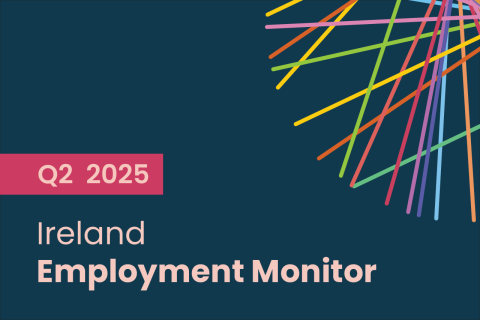Ireland Employment Monitor: Remote working the rule, not the exception, among candidates

The Morgan McKinley Quarterly Ireland Employment Monitor registered a 9.05% increase in the number of new professional job opportunities in Q2 2022 compared to the previous quarter across all professional sectors.
The monitor also recorded an increase of 11.45% in the number of professionals actively seeking new job opportunities in Q2 compared to the first quarter of the year.
The monitor measures the pulse of the Irish professional jobs market by tracking the number of new job vacancies and new candidates within the Republic of Ireland each quarter. In order to reflect the changing dynamics of the current employment market, we are including both permanent and contract jobs in the Employment monitor.
The latest monitor shows salary expectations have risen among new hires, with candidates seeking higher salaries as part of contract negotiations. This is being driven by a number of factors, not least the volume of new positions outstripping the number of candidates available and also the surge in economic inflation to over 9%.
Trayc Keevans, Global FDI Director, Morgan McKinley Ireland, said:
“We are definitely seeing a candidate driven market at the moment. The Irish economy has rebounded strongly from the recurrent lock-downs caused by the pandemic and across all our industry sectors we are seeing strong demand in a very competitive market for talent. We are once again seeing near full-employment with CSO figure showing unemployment of 4.8% in June 2022 which is almost the same as pre-pandemic levels in early 2020.
“IDA Ireland has had a strong start to the year with Q2 showing strong investment in Ireland by new and existing investors. 155 new investments were won for Ireland in the first half of the year bringing significant employment potential of up to 18,000 jobs. Enterprise Ireland clients too have had a strong start to the year on the back of a historical record for the number of net new jobs created in Irish companies in 2021.
“The supply and demand effect of professionals is driving an increase in salaries for new starters with many seeking to off-set the impact of rising inflation by negotiating higher starting salaries. In a candidate driven market employers have to offer more competitive salary and benefits to attract new hires or at least consider deploying more creative compensation and benefits packages that will appeal to the talent cohort they are seeking to attract.
“The market for talent is very competitive and hiring managers have been feeling the pinch, especially in sectors that are already relatively competitive. Organisations are taking a number of different approaches to counter this situation and retain talent including ongoing learning and development opportunities, as well as offering a variety of flexible working arrangement options which more recently has included allowing international employees to work from their home country for a short duration in the calendar year.
“Remote working has become the benefit most in demand. It is now expected that some element of remote working will be available and many candidates will not entertain opportunities where at least some element of remote working is not offered. We see this particularly in the tech sector, where a Morgan McKinley poll found that 51% of candidates surveyed would refuse to put their CV forward for a role if it did not permit them a full-time remote working arrangement. This appetite for remote working is also extending to roles which traditionally were performed onsite. We are currently seeing engineering and life sciences professionals pushing for hybrid working arrangements and requesting one or two days of remote working.
“Consistently across multilingual talent, hybrid and work-from-home arrangements are an expectation from the majority of candidates. Two years of remote working arrangements during the pandemic means candidates have become accustomed to the arrangement. Many multilingual sales candidates are refusing even hybrid arrangements and companies unwilling to offer flexible working options are seeing high rates of turnover within their multilingual talent. There is some correlation here to the costs of rent and availability of housing versus salary earned and where this cohort of employees can afford to live and commute from.
“Fuel costs are increasingly a driving factor in the increased desire for work-from-home arrangements according to candidates across all sectors with professionals whose work would require they be ‘on site’ also seeking hybrid and remote work due to the rising cost of fuel.
“There is however a cohort of young people, many in shared rented accommodation who do not have proper facilities that would allow them to work from home, who want to be in an office – both from a social and work point of view. There is a danger that this cohort will be overlooked and not catered for in the ‘new norm’ of hybrid or remote working”.
“Remote working has allowed companies to consider a nationwide talent pool for some positions which they would have historically employed locally based talent for. However, the increasing price of housing and the shortage of accommodations continues to be an issue for companies who do not offer fully remote working options. In this sense, we are seeing employers refusing to consider applicants who are not already living in the commuting area of their offices as they so not have confidence that applicants who are willing to relocate will be successful in securing accommodation should they be offered the job due to the housing shortages.”
“We are also seeing what I call a ‘Covid Rush’ of inward migration. Throughout the pandemic Big Tech companies in particular continued to recruit, allowing many new hires to work remotely from their home country. These companies are now actively seeking to regularise a return to office-based employment mainly on a hybrid model and employees must relocate to Ireland by the end of August in order to meet Revenue requirements. This is leading to pressure on both long and short term accommodation through to September. We are advising companies who may be seeking to bring in talent from abroad to factor this into their hiring timelines.
“The one sector where there has been a more conservative approach to hiring has been in early stage investor backed tech start-ups. As of June 2022, it was reported in the US that tech companies around the world had laid off 35,000 employees. While there has not been evidence of significant lay-offs in the local market yet, we are seeing that where once start-ups were given the luxury to hire at will, recruitment is now being undertaken in line with productivity and business need.
“Ireland’s resilience and recovery momentum is evident across the economy and confidence remains high among job seekers but we are seeing some caution beginning to emerge as global events impact on consumer and business confidence and we will be monitoring this closely in our Q3 monitor”.
Current most in-demand positions by discipline:
Executives: Chief Technology Officers (CTOs), Vice Presidents of Engineering
The Executive market is still very buoyant and shows no sign of slowing down. Hiring dynamics are particularly strong among early stage/growth companies who are looking to secure strong leadership. Companies are increasingly taking a global approach to look for the right Executive profile. Senior Executives are also pushing negotiations for larger packages.
Funds: Fund Accountants, Designated Person Roles, Portfolio Managers
Post-Brexit we continue to see new fund jobs relocating from London to Dublin. The market is busy and in-demand skill sets are regulatory, governance, investment oversight and private equity skills.
Banking & Insurance: Mortgage Underwriters, Credit Analysts, Mortgage Advisors, Branch Managers, Pension Administrators
Salaries have remained relatively stable in banking and insurance over the last 12 months. The withdrawal from the market of KBC and Ulster Bank has seen a market adjustment with many banking candidates departing from these banks being offered roles directly with competitors. In the insurance space, there has been increased demand in roles across various levels over the first half of 2022.
Tech: Full-Stack Developers, Data Scientists, Security Analysts, Data Engineers, SOC Managers, Security Engineers, Risk Modelers, Data Analysts. Programming skills remain in strong demand.
A shortage of candidates has increased day rates among contract technology professionals. Smaller companies unable to compete on benefits with larger companies to attract permanent staff are increasingly seeking talent from the contract market.
Life Sciences: Process Engineers, QA Managers, Automation Technicians, Maintenance Technicians
Many life sciences companies are expanding at present. As a consequence, the demand for candidates is currently outweighing the supply, which is putting pressure on salaries within this industry sector. In order to entice candidates, smaller life sciences companies are streamlining their interview processes while larger employers in the sector are actively increasing salary bands by up to 10%.
Legal: Company Secretaries, Junior Lawyers, Corporate, Technology and Employment Lawyers.
Salary increases are due to a shortage of legal talent under 5 years post qualified experience – many newly qualified lawyers left Ireland during the pandemic for new roles in the UK and Australia and legal firms are now trying to entice candidates to return to Ireland.
Multilingual: Customer Support Representatives, Sales Development Representatives, Account Executives, Operations Administrators
Within sales, the market remains highly competitive with employers constantly hiring at volume Due to talent retention issues among hard-to-find languages, salaries are especially on the rise for German, Nordics, Dutch, and French. Easier-to-source language professionals such as Italian, Spanish, and Portuguese are seeing comparatively stable salaries.
Office Support: Administrators, Office Managers
Demand has increased overall for office administration professionals in particular for technical skills such as SAP, Salesforce, Logistics and project management. In addition to increased salary expectations, benefits, culture and values are of increasing importance to administrative support candidates.
HR: HR Generalists, HR Business Partners, Recruiters, Senior HR Managers
Starting salaries for HR graduates with no experience has grown by almost 10% and salaries across all midlevel roles have been driven upward due to a limited pool of candidates. There has been an increase in companies hiring temporary employees in Q2 to assist with HR workloads.
Marketing: eCommerce Executives, eCommerce Managers, Digital Marketing Managers, Social Media Managers
The pandemic forced many ‘bricks and mortar’ businesses online and we are seeing increased demand for ecommerce specialists and digital marketing experts as a result. In Dublin, Digital Marketing / Communication Executives with 0 – 3 years’ experience are seeing the greatest demand and pressure on salaries as a result.
Sales: Account Managers, Business Development Managers, Sales Executives, Senior Sales Executives.
Due to a shortage of available candidates within the sales sector compared to hiring demands, salaries are continuing to rise. Key skills in high demand within sales include relationship building, relationship management and business development across the full sales life cycle. Candidates are increasingly expecting flexible and remote working options as these remain the primary enticing factors for attracting sales talent.
Accounting & Finance: 12-months FTC Finance Managers, Financial Accountants, Financial Analysts, Accounts Payables Clerks
High demand and low availability of talent is driving salary increases in permanent roles in Accounting and Finance across all disciplines, both at the point of hire and within existing roles. Contract salaries are not matching permanent salaries, leading to candidates abandoning or declining contract positions for more lucrative permanent roles. Permanent base salaries for professionals with 1 to 3 years of Post Qualified Experience (PQE) have increased up to 15 percent in some instances over the past number of months.
Project, Transformation & Consulting (PTC) Business Analysts, AGILE Coaches, SCRUM Masters, Project Managers, Programme Managers.
In Q2 there was a surge in demand for business analysts due to the launch of a wide variety of Digital Transformation Programmes. Among project and programme managers, regulatory and regulatory readiness experience continues to be popular amongst employers. In contrast to other industries, salaries remained stable within the PTC space. Hybrid and remote working options remain key motivators among candidates in selecting roles; in-office candidates expect higher degrees of flexibility surrounding office hours.
Engineering: Process Engineers, Chemical Engineers, Electrical Engineers, Mechanical Engineers
Recruitment is still very busy across the engineering sector, particularly in manufacturing where the demand for process and electrical engineers is still at an all-time high. A significant number of employers are currently reviewing their graduate programs as they try and entice the best emerging talent, before they have formally graduated. Given the reducing times currently to process critical skills work permits as of early July this was running at 6-7 weeks, employers are increasingly interested in attracting engineers from abroad.
Supply Chain & Procurement: Procurement Managers, Demand Planners, Schedulers, Supply Chain Project Managers
In Supply Chain and Procurement, an increase in salaries is being noticed as the demand for professionals increases amongst a steady pool of available talent. After the challenges of the last 2 years, companies are shifting their focus from an emergency business model to a value-add mindset, where procurement roles are seen as a strategic investment. This investment mindset brings the hiring of Project Managers and Procurement Managers to the forefront. The COVID-19 crisis and subsequent lockdowns also shed light on the importance of having an efficient supply chain, which explains a surge in the hiring of Supply Chain professionals as the economic circumstances improved. To entice new hires, many companies are hiring candidates without industry hard-skills and training them into their qualifications.











